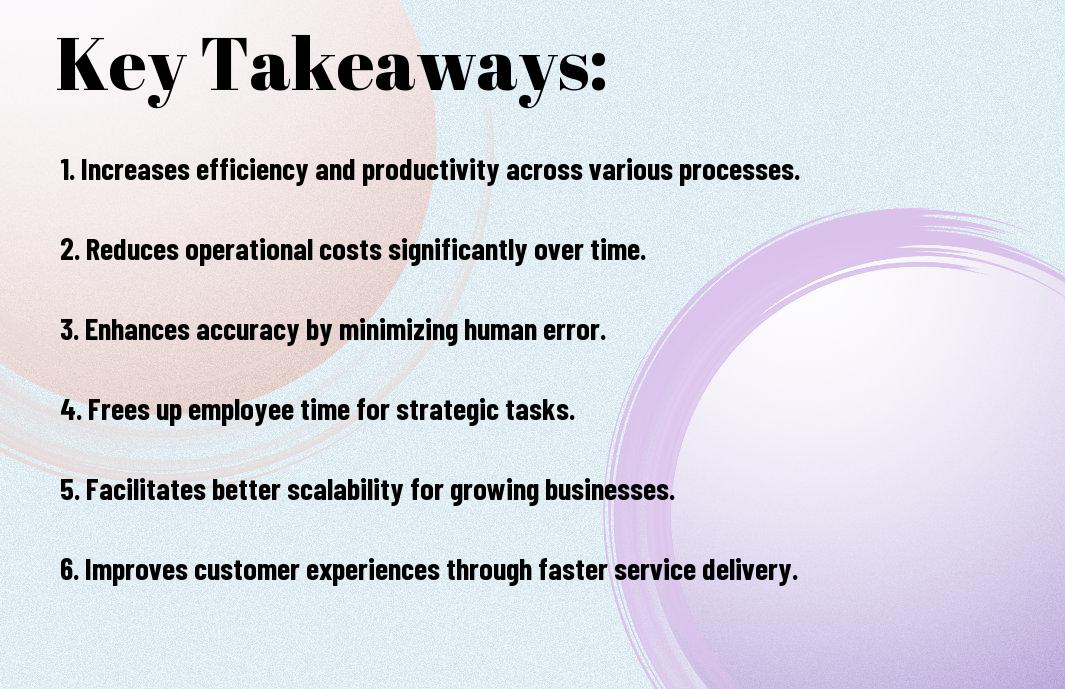There’s no denying that automation has transformed the landscape of modern business, making it a vital strategy for staying competitive. As you explore the benefits and implications of automating your operations, you’ll discover how it streamlines processes, reduces costs, and enhances productivity. From customer service chatbots to advanced data analysis, understanding the role of automation today will empower you to make informed decisions that can significantly elevate your business performance. Dive into the ways automation can revolutionize your workplace and give you the edge needed to thrive in an increasingly tech-driven world.
Key Takeaways:
- Increased Efficiency: Automation streamlines repetitive tasks, allowing businesses to operate faster and often with fewer errors.
- Cost Reduction: By automating tasks, companies can lower operational costs through reduced labor expenses and increased productivity.
- Enhanced Customer Experience: Automating customer interactions, such as responses and support, leads to consistency and quicker service, improving client satisfaction.
- Data-Driven Insights: Automation facilitates the collection and analysis of data, enabling businesses to make informed decisions and identify trends more effectively.
- Scalability: Automation allows businesses to easily adjust and expand their operations without significantly increasing costs or resources.

Understanding Automation
Before venturing into the world of automation, it’s crucial to comprehend its significance in modern business. Automation streamlines processes, enhances productivity, and reduces errors, making it an indispensable tool for companies looking to thrive in competitive environments. For an in-depth look at how automation can revolutionize your operations, check out Why Business Process Automation is a Game Changer for Small Businesses.
Definition of Automation
Any process that utilizes technology to perform tasks with minimal human intervention is considered automation. This can range from simple tasks to complex workflows, ultimately allowing your business to operate more efficiently.
Types of Automation in Business
- Robotic Process Automation (RPA)
- IT Process Automation
- Business Process Automation (BPA)
- Test Automation
- Industrial Automation
The proper automation strategy can substantially enhance your business operations.
| Types of Automation | Description |
|---|---|
| Robotic Process Automation | Uses software robots to automate high-volume, rules-based tasks. |
| IT Process Automation | Automates IT services and processes to improve efficiency. |
| Business Process Automation | Streamlines repeatable tasks across business functions. |
| Test Automation | Automates testing for software applications to enhance quality. |
| Industrial Automation | Involves using control systems for equipment in manufacturing. |
Understanding the different types of automation empowers you to choose the best fit for your business needs. By leveraging the right automation tools, you can optimize workflows and drive efficiency. Consider the following:
- Assess your current processes for automation potential.
- Identify areas where automation can save time and money.
- Explore tools that fit your technology stack.
- Evaluate scalability options for future growth.
- Seek feedback from your team to improve implementation.
The understanding of automation types is vital for integrating effective solutions into your operations.
Benefits of Automation
Now, you can harness the transformative power of automation to streamline processes and enhance business operations. By implementing automation technologies, you unlock a world of benefits that can significantly improve your productivity and effectiveness. From increased efficiency to substantial cost savings, automating tasks allows you to focus on strategic initiatives that drive growth and innovation for your business.
Increased Efficiency
At the core of automation is its ability to boost your operational efficiency. By automating repetitive tasks, you minimize human error and ensure consistent output. This means that you and your team can allocate time and resources to more critical areas, enhancing workflow and ultimately achieving higher productivity levels.
Cost Reduction
Among the most significant advantages of automation is the potential for cost reduction. By reducing manual intervention, you can decrease labor expenses and minimize operational risks, leading to lower overhead costs.
Further, automating processes helps in optimizing resource allocation, cutting unnecessary expenditures, and enhancing your ability to scale operations without incurring significant additional costs. You can invest the savings back into your business, allowing for innovation and growth while maintaining a competitive edge in the market. This strategic approach reinforces the value of automation as a key driver for reducing costs and improving your bottom line.

Impact on Workforce
Your understanding of automation in business would be incomplete without considering its impact on the workforce. As automation technologies evolve, they fundamentally alter job roles and the skills required in the labor market. While some traditional positions may see a reduction in demand, others are transformed, pushing workers to adapt and upgrade their skills to thrive in this new landscape.
Job Displacement Concerns
Impact on the workforce has sparked widespread concerns about job displacement due to automation. Many fear that machines will replace human workers, leading to significant unemployment in certain sectors. The challenge lies in balancing efficiency and productivity with the social responsibility of providing secure employment for your community.
New Opportunities Created
Displacement in certain job sectors doesn’t tell the whole story; new opportunities are emerging as a result of automation advancements. Businesses will require a workforce skilled in managing, designing, and maintaining these automated systems, presenting fresh career paths and professional growth for you.
Also, as companies streamline operations through automation, they can focus on innovation and the development of new products and services. This shift leads to the creation of roles in areas like data analysis, software development, and strategic planning. By expanding your skillset and embracing lifelong learning, you can leverage these new opportunities to advance your career in an evolving job market.
Automation Technologies
After evaluating the landscape of business operations today, you can see a wide variety of automation technologies revolutionizing the way companies function. From software solutions that streamline processes to interconnected devices that enhance efficiency, these technologies pave the way for significant improvements in productivity, accuracy, and cost savings, allowing businesses to adapt swiftly to market demands.
AI and Machine Learning
About AI and machine learning, these innovative technologies leverage algorithms to analyze data patterns, enabling your businesses to make informed decisions. By automating repetitive tasks and offering personalized insights, they enhance your operational efficiency and customer experience, transforming the way you engage with your audience.
Robotics and IoT
Along with AI, robotics and the Internet of Things (IoT) offer extraordinary capabilities to your business. These technologies allow for the automation of physical tasks and the gathering of real-time data, creating a seamless flow between digital and physical operations. This integration fosters greater insights and more responsive systems, further enhancing your operational effectiveness.
Further exploring robotics and IoT, they collectively empower your organization to automate everything from inventory management to predictive maintenance. By harnessing connected devices, you can gather crucial data that helps in optimizing workflows, minimizing downtime, and improving overall resource allocation. This level of automation not only boosts productivity but also enables you to stay ahead in a competitive market.

Case Studies
Despite the challenges, numerous companies have successfully implemented automation, demonstrating its transformative power. Here are some compelling case studies showcasing the impact of automation:
- Amazon reduced its order processing time by 40% through robotic automation in warehouses.
- Sephora increased its online sales by 20% by implementing AI-driven chatbots for customer service.
- General Electric improved its manufacturing efficiency by 25% by adopting smart factory technologies.
- Netflix saved over $1 billion in content delivery costs by automating its streaming service.
Success Stories from Various Industries
For many businesses, automation has led to remarkable success across various sectors. In the automotive industry, Tesla’s use of automation in production has increased vehicle assembly speed by 50%, while in finance, JPMorgan Chase saved approximately $8 billion by automating repetitive tasks like data entry and analysis. These examples illustrate how automation not only improves efficiency but also enhances competitiveness in the market.
Lessons Learned from Automation Failures
Success in automation isn’t guaranteed; some companies have faced setbacks.
Understanding past failures is vital for your journey in automation. For instance, in 2017, a prominent airline experienced significant operational disruption after implementing an automated system that failed to account for irregularities in flight scheduling, resulting in thousands of canceled flights. This incident teaches you the importance of thorough testing and contingency planning when integrating automation into your business processes. By learning from these experiences, you can better navigate the complexities of implementing effective automation strategies.
Future Trends in Business Automation
Unlike traditional methods, businesses are rapidly embracing advanced automation techniques to stay competitive. This shift not only enhances efficiency but also transforms how tasks are performed, paving the way for innovative approaches to workflow management. As you explore these evolving trends, you’ll discover how embracing automation can lead to significant advantages in productivity and decision-making.
Predictions for the Next Decade
Future forecasts indicate that business automation will become even more integrated into daily operations, with machine learning and AI driving personalized customer interactions and streamlined processes. You can expect organizations to leverage these technologies to make data-driven decisions, enhancing overall effectiveness and satisfaction.
Emerging Technologies to Watch
Besides established automation tools, keep an eye on emerging technologies that have the potential to revolutionize your business operations. Innovations in artificial intelligence, robotic process automation (RPA), and the Internet of Things (IoT) are set to redefine efficiency and connectivity.
Next, you should pay attention to how these technologies will evolve. For instance, AI-powered chatbots will enhance customer service capabilities, while RPA can automate repetitive tasks across departments, freeing up your team for more strategic work. The integration of IoT devices will provide real-time insights, allowing for smarter inventory management and operational adjustments. Embracing these emerging technologies will be instrumental in maintaining your competitive edge in the years to come.
To wrap up
The impact of automation in business cannot be overstated—it has the power to transform how you operate, making processes more efficient and cost-effective. By embracing automation, you can free up valuable time to focus on strategic initiatives while enhancing your overall productivity. As you consider integrating automation into your business model, explore insights on Why Harnessing Automation Can Be Your Company’s … to ensure you’re capitalizing on this game-changing opportunity.
FAQ
Q: Why is automation considered a game-changer for businesses today?
A: Automation allows businesses to streamline processes, reduce human error, and increase efficiency. Automated systems can handle repetitive tasks, freeing up employees to focus on higher-value activities, which can lead to increased productivity and innovation within the company.
Q: How do businesses benefit financially from automation?
A: By automating tasks, businesses can reduce labor costs and minimize operational expenses. For instance, automating routine tasks can cut down on overtime expenses and the need for additional hires. This leads to cost savings that can be reinvested into other areas of the business.
Q: What role does data play in business automation?
A: Automation systems often harness data to improve decision-making. These systems collect and analyze large volumes of data in real-time, allowing businesses to gain insights into customer preferences, market trends, and operational efficiencies that were previously difficult to ascertain manually.
Q: How can automation improve customer experience?
A: Automation can enhance customer experience by providing faster response times and personalized service. For example, chatbots can handle inquiries around the clock, while automated email campaigns can deliver tailored content based on user behavior, ensuring that customers receive relevant communication when they need it.
Q: What are some common areas in a business where automation is applied?
A: Automation can be applied across various business functions, including marketing, sales, customer service, inventory management, and human resources. Each area benefits from automation in different ways, whether it’s through managing lead generation, streamlining recruitment processes, or optimizing supply chains.
Q: Are there any challenges associated with implementing automation in business?
A: Yes, some challenges include the initial investment in automation technology, the need for employee training, and potential resistance to change from staff. Additionally, businesses must ensure that their automated systems are carefully monitored and adjusted to avoid issues like system failures or inaccurate data processing.
Q: How does automation affect the workforce?
A: While there are concerns that automation may lead to job displacement, it can also create new opportunities for employees. Automation can shift roles into more strategic positions that require human skills such as problem-solving, creativity, and interpersonal communication. Companies that invest in reskilling their workforce can benefit from an engaged and educated team ready to tackle evolving challenges.



